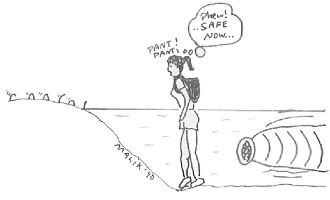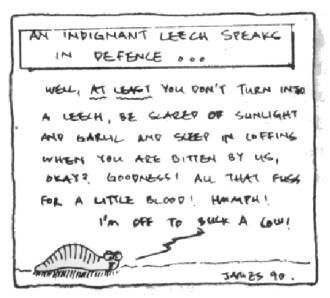 |
Homepage
Other articles
Other projects
National University of Singapore
| Leeches By N. Sivasothi Drawings by Abdul Malik |
 |
I must confess that I used to suffer from similar concerns and was never comfortable with leeches. Hence, it was with much sweat on my brow that I approached my first year students during the annelid practical. You see, the lecturer in charge suggested that we demonstrate the locomotory and feeding aspects of the animal. He should have screened a horror movie instead, I felt for knowing the first years I demonstrated for, none of them would volunteer for the test but would rather delight in my misery (as they do during each practical).
Unfortunately, the leeches that were involved in the demonstration were lacking spirit and died mysteriously after taking a sip of my blood. Needless to say, this was cause for much comment, little of which was favourable. There was much sympathy for the leech, though. But I cannot claim to be unprepared for that demonstration: I was part of the group that 'willingly' served as bait in Johore in order to entice the leeches out.
Leeches normally lie waiting amongst leaves in the surrounding vegetation or on the ground and start waving about when stimulated either by our radiating body heat or by heavy tramping that announces the approach of a hearty meal. All they have to do is make their way towards you. So we wandered slowly in the forest while one of us called out to them to come and get us, much to the agitation of many of the rest who were having second thoughts about serving as bait. Watching a leech make its way determinedly towards you is not good for the morale. We are, able to avoid or protect ourselves against many things in the jungle but there's little one can do when one of those critters is on the hunt.
The smaller ones which are less intimidating are actually worse for they can permeate your socks or lace holes and get at you. Only when contemplating a bloody foot back at base camp would you realise that there actually many leeches around. So, for once, man is the prey and this unusual position is an unnerving one for him. Also, many have an aversion to the idea of loosing blood, and leeches are honest-to-goodness blood suckers.
Their bites are usually difficult to detect because their saliva contains an anaesthetic. In addition, their teeth are very sharp. After making an incision, a histamine-like substance is injected into the cut which causes vasodilation. The copious flow is maintained during the sucking phase by the anticoagulant hirudin,which derives its name from the leech's phylogenetic class.
 The
bloody meal may be 2 to 5 times it's own body weight after which the leech
drops off, "burping in satisfaction along the way". They are so good
at what they do that they have been used for blood-letting—the medicinal
leech.
The
bloody meal may be 2 to 5 times it's own body weight after which the leech
drops off, "burping in satisfaction along the way". They are so good
at what they do that they have been used for blood-letting—the medicinal
leech.Our catch of the day was limited by Murphy's Law (1) and it was with a shrug of relief that we decided we were not going to be swamped with leeches. During the ride back to campus, a classmate of mine periodically (and spasmodically) checked herself for leeches for the little that were present had proven quite fond of her blood. I had jested that if any were still lurking around unsatisfied in the van, they'd making their way en- enthusiastically towards her. Others who had not been claimed victim of the leeches during the trip were much more comfortable as were the two guys in front of me who were sleeping so soundly that their heads were entwined like lovers.
Do not expect such luck when you are out on a holiday though. During a recent trip to Borneo, on a single occasion that my pals and I spent a day going through secondary forest, we picked a minimum of 20 per person within hours. And this was while we were moving through the forest at a fast pace. I'm just glad we didn't settle down to sleep there!
 One of the guys who had laughed at the phenomenon of flying leeches during
a movie we watched the previous night, was made to appreciate the authenticity
of the statement. Sometimes they drop down from relatively great heights
and to us it appeared as if they were skydiving with little yelps of excitement
as they fell on their food.
One of the guys who had laughed at the phenomenon of flying leeches during
a movie we watched the previous night, was made to appreciate the authenticity
of the statement. Sometimes they drop down from relatively great heights
and to us it appeared as if they were skydiving with little yelps of excitement
as they fell on their food.  But
we were rather lucky - friends of ours had watched agape as hordes of leeches
approached them wavingly in a hotly competed (last one there is a sucker!)
race. Some of the guys went into water for refuge and discovered aquatic
leeches.
But
we were rather lucky - friends of ours had watched agape as hordes of leeches
approached them wavingly in a hotly competed (last one there is a sucker!)
race. Some of the guys went into water for refuge and discovered aquatic
leeches.It is always amusing to watch the scene enacted by a group of people travelling together when one member discovers a leech on his person. His reaction could vary from a helpless wail with ineffective attempts to flick the leech off to more dignified attempts like attempting to keep his voice steady while asking for help. His friends, however, are usually more interesting to watch as they go into a frenzy of checking with obviously worded faces. Once sure that they are free of bloodsuckers, the group converges on the poor animal to stamp on it, burn and/or hack it to pieces. This is done with a great deal of viciousness even by normally mild-mannered people.
Does man remain in helpless terror of the leech? Methods such as soaking socks in tobacco juice or materials like leech-proof socks exist and each individual swears by his book of spells. We realised that any insect repellent is suffice to end your woes. We applied repellent to our bodies and probable sites of entry-holes in boots, edges of socks, waist and shirt sleeves. The last was deemed necessary after one of us found an orange striped leech in his armpit. (Earlier when I mentioned 'unexpected places' I meant anatomical as well geographical ones). One result of this sparse application (our supply lasted for more than six weeks) of repellent resulted in only a single successful leech bite suffered by the three of us for the duration of the trip. Most of the time, although we did pick up leeches up frequently, the repellent seem to make them feel uncomfortable about sinking their teeth into our skin. It was then a simple thing to flick them away.
 If
you are inconsolably averse to leeches, avoid what they like: damp areas.
The best solution really is to put on repellent and ignore them. A friend
observed that indigenous peoples he came across who lived of the jungle
seemed oblivious to their presence. After all, the animal is not known to
cause or transmit disease. But I guess this remains difficult for many who
share an aversion for the annelid. So for this majority, keep a bottle of
"Axe" oil with you when you wander into leech-infested areas and you'll
be fine. But they are not really bad animals, you know!
If
you are inconsolably averse to leeches, avoid what they like: damp areas.
The best solution really is to put on repellent and ignore them. A friend
observed that indigenous peoples he came across who lived of the jungle
seemed oblivious to their presence. After all, the animal is not known to
cause or transmit disease. But I guess this remains difficult for many who
share an aversion for the annelid. So for this majority, keep a bottle of
"Axe" oil with you when you wander into leech-infested areas and you'll
be fine. But they are not really bad animals, you know! © N Sivasothi, 2001